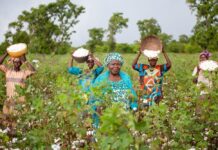Zambia’s agriculture sector growth prospects are bright but it is dependent on the inclusion and effective participation of the private sector in policy formulation, execution and decentralisation while reducing bureaucracy to attract goodwill from the donor community, an agriculture expert has noted.
Last August, Zambia and the cooperating partners joined hands in seeking solutions to the pitfalls that affected the execution of the National Agriculture Investment Plan (NAIP) with a resolve to amend all shortcomings and ensure effective execution of the revised second initiative to ensure maximum growth of the sector.
But speaking at the High Level Inter-Ministerial Dialogue Meeting on Agriculture Investment Plan (NAIP) .Agriculture Support Programme (ASP)-agriculture consultant Alain Onibon noted some shortcomings including the exclusion of the private sector and the youth in policy execution, being one of the prerequisites for financial support.
Other concerns included the lack of decentralization in execution of agriculture related policies, the need for the Government to mobilize local resources to support the sector growth while allowing massive inclusion of players from the private sector as a guarantee for donors to appreciate the initiative was to benefit local people.
“Agriculture development has strong goodwill from various interest groups especially the donors and lending institutions but there is need for unwavering political will, involvement and wholesome participation of the women and youth through aggregated groupings to attract financiers to guarantee loans and at an affordable rates. “he told FRA on the sidelines adding:
Onibo, regretted the massive pitfalls that contributed to the fall of the first NAIP programme of 2014-18, which among other shortcomings lacked comprehensive statistical data to collectively give an overall performance of the sector.
Funding fell short of the desires of the sector’s development vision, prompting a revision by the Government as it embarked on revitalization of the sector and claimed the best continental supplier of food.
“There is a need to interrogate the pitfalls in the previous NAIP, encourage mechanization of the sector and speed up the progression of the transformation process noting: We need political will, commitment by the Government, otherwise it will be a failed project,”
Cooperating partners-Germany, Food and Agriculture Organisation, Alliance for a Green Revolution in Africa [AGRA] and the Agriculture Consultative Forum (ACF) among others have extended their desire to be part of the agricultural revolution through smart, innovative and evidence-based investment planning.
The initiative, it is envisaged, will assist Zambia to bolster agriculture production-using various players-youth and women included to grow enough crops and reduce Zambia’s surging poverty among households while helping to bolster the country’s vision to become a continental food basket and exporter.
Representing the donor community, Food and Agriculture country representative in Zambia, Suze Filippini affirmed the cooperating partners’ desire investment commitment to become a net exporter of value added produce.
The donor community realizes Zambia’s unwavering desire to change the destiny of the country and that of the continent’s food security through reigniting NAIP and are ready to contribute financial and technical support for the development of a sustainable, dynamic, diversified and competitive agricultural sector.
It is the donors’ desire to see a transformed agriculture sector and assure the country of food security at household and national levels and help bolster the country’s Gross Domestic Product (GDP).
Analysts have adduced that Zambia’s agriculture sector has fallen dismally-far below its potential to promote food and nutrition security, create jobs for women and youth. The study showing the sector’s lack of impetus to generate the much needed revenue through cross border trade is what has attracted donor’s ‘financial sympathy’
This has attracted the donors and wants to help revive the sector, given President Hakainde Hichilema’s Government to give the sector a new lease of life and rebuild the continent’s food needs amid a myriad of calamities.
“It calls for smart, innovative and evidence-based investment planning for the agriculture sector, so as to enable it to contribute significantly to economic growth, poverty reduction, employment creation, and economic diversification.” Ms. Filippini, also FAO country representative, said.
Most value chain support presently focuses on one or two specific commodities, and fails to motivate agricultural diversification, especially among smallholder farmers. The formulation process of the second generation NAIP would necessitate a comprehensive redress of all shortcomings for effective beneficiation.
Speaking at the same occasion, agriculture minister Reuben Mtolo, remains optimistic that Zambia was poised to be the regional food basket, driven by consistent policy formulation noting that the reputation as Africa’s largest producer and exporter of seed was evidence enough to ascertain the future of the country.
Finance minister in announcing the 2023-US$11.2 billion budget remains optimistic that Zambia’s agriculture transformation programme was headed for a boom.
The country has secured markets in China and other parts of Africa and beyond-spurred by the Comprehensive Agriculture Programme-which has sucked the FISP to draw more farmers for sector growth.
The Comprehensive Agriculture Support Programme goes beyond fertilizer and seed, and I designed to offer technical assistance to small-scale farmers.
Fertilizer provision alone without other things cannot uplift the small-scale farmers therefore the CAP will seek to intensify the help and technical assistance to the farmers from the extension officers.
Fertilizers are needed because they are an important ingredient for the farmers but now, it’s not enough just to give fertilizer, but the farmers should also be taught on how to apply the fertilizers correctly, and told on the new farming methods that are available and which seed are suitable for the area they are based in.
“Tell the farmers the possibility that some of them may buy chemicals for weeding rather than depending on manual weeding, as they can use chemicals to get rid of weeds,” he said.
Zambia, he notes will soon be a bread basket for global consumers and it is gearing for the would be demand.
“Many countries want food from Africa, so the market is there,” he said










[…] Source link […]
Comments are closed.